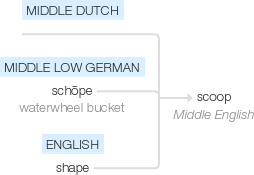Scoop
Middle English (originally denoting a utensil for pouring liquids): from Middle Dutch, Middle Low German schōpe ‘waterwheel bucket’; from a West Germanic base meaning ‘draw water’; related to the verb shape.
wiktionary
From Middle English scope, schoupe, a borrowing from Middle Dutch scoep, scuep, schope, schoepe(“bucket for bailing water”) and Middle Dutch schoppe, scoppe, schuppe("a scoop, shovel"; > Modern Dutch schop(“spade”)), from Proto-Germanic *skuppǭ, *skuppijǭ, from Proto-Indo-European *(s)kep-(“to cut, to scrape, to hack”). [1].
Cognate with Old Frisian skuppe(“shovel”), Middle Low German schōpe(“scoop, shovel”), German Low German Schüppe, Schüpp(“shovel”), German Schüppe, Schippe(“shovel, spade”). Related to English shovel.
etymonline
scoop (v.)
mid-14c., "to bail out," from scoop (n.) and from Low German scheppen "to draw water," from Proto-Germanic *skuppon (source also of Old Saxon skeppian, Dutch scheppen, Old High German scaphan, German schöpfen "to scoop, ladle out"), from PIE root *skeubh- (source also of Old English sceofl "shovel," Old Saxon skufla; see shove (v.)). In the journalistic sense from 1884. Related: Scooped; scooping.
scoop (n.)
early 14c., "utensil for bailing out," from Middle Dutch schope "bucket for bailing water," from West Germanic *skopo (source also of Middle Low German schope "ladle"), from Proto-Germanic *skop-, from PIE *(s)kep- "to cut, to scrape, to hack" (see scabies). Also from Middle Dutch schoepe "a scoop, shovel" (Dutch schop "a spade," related to German Schüppe "a shovel," also "a spade at cards").
Meaning "action of scooping" is from 1742; that of "amount in a scoop" is from 1832. Sense of "a big haul, as if in a scoop net" is from 1893. The journalistic sense of "news published before a rival" is first recorded 1874, American English, from earlier commercial slang verbal sense of "appropriate so as to exclude competitors" (c. 1850).
